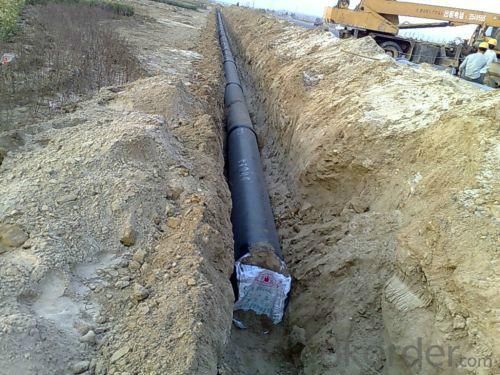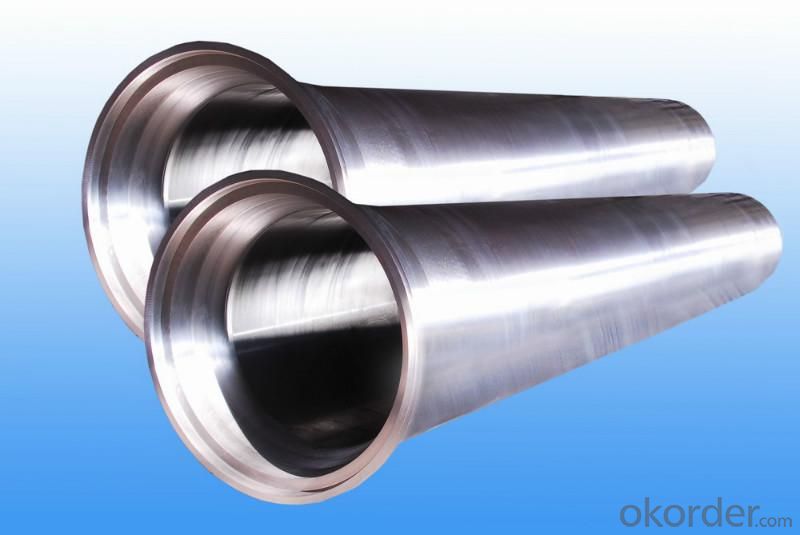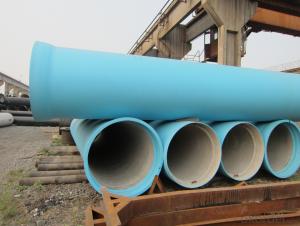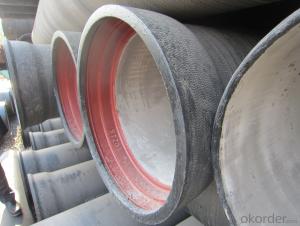Ductile Iron Pipe of China On Sale DI Pipe DN250 EN598
- Loading Port:
- China main port
- Payment Terms:
- TT or LC
- Min Order Qty:
- 20 m.t.
- Supply Capability:
- 200000 m.t./month
OKorder Service Pledge
OKorder Financial Service
You Might Also Like
1. Ductile Iron Pipe Description :
1) Pipes confirm to ISO2531,K9 class,T type joint,6m long,with inside cements lining conform to ISO4179, outside Zinc spraying(130g/m2) and bitumen coating(70μm) conform to ISO8179.
2) Pipe ends: Spigot and socket ends, with 100% SBR rubber gaskets accoding to ISO4633
3) we can do third party inspection according to customer's request.
4) Our products have been sold to many international market, such as Middle East and South East Asia and Africa.
2. Main Features of the Ductile Iron Pipe:
•High yield strength
•High tensile Strength
•High corrosion resistance
•Pressure Resistence
•Anti-corrosion
•Installation is convenient
•Satisfy the highest hygienic standards
3. Ductile Iron Pipe Images:


4. Ductile Iron Pipe Specification
Standard: API SPEC 5L 44th eidtion,ASTM A252-98(2007)
Grade: A53 Grades A/B, ASTM A106 Grades B/C,ASTM A179,AWWA, C200, ASTM A139, ASTM A120, API 5L Grade B,X42, X52, X56, X60, X65, X70, X80, X100
Weld Alternatives: LSAW
OD size range: 6.4~44.5mm
Wall thickness: 406.4~1422mm
Length: 3 - 12 m according to requirment
Note: Other grade can also be provided after consulting. Special design are available
5. FAQ:
We have organized several common questions for our clients,may help you sincerely:
1).Q: Why would you choose ductile iron pipe rather than other pipe materials?
A:The reasons are obvious for that not only ductile iron pipe possesses the inherent strength and flexibility of ductile iron, combined with proven corrosion protection systems, but also the cost savings can be achieved from design to installation and commissioning.
2).Q:Why can you guarantee the inner of pipes can’t be corroded?
A: High alumina cement mortar lining and sulphate-resistant cement mortar lining. These two special linings are applicable to inner anti-corrosion for sewage pipes, improving resistance to erosion of the sewage components.
- Q:How do ductile iron pipes handle ground movement due to tree roots?
- Ductile iron pipes possess a robust and enduring nature, rendering them exceptionally resilient against ground movement induced by tree roots. The flexibility of ductile iron enables it to endure the pressure exerted by growing tree roots without fracturing or breaking. This capability is attributed to the material's aptitude for absorbing and dispersing stress, thereby minimizing the impact of ground movement. Furthermore, ductile iron pipes exhibit a sleek inner surface that diminishes the likelihood of tree roots infiltrating. The firmly sealed joints between the pipes likewise prevent root penetration and subsequent harm. In cases where tree roots do manage to infiltrate the soil and make contact with ductile iron pipes, their resistance to corrosion offers an additional advantage. Ductile iron pipes are coated with a protective layer that thwarts the formation of rust and corrosion, guaranteeing their long lifespan and structural integrity. Nevertheless, it is imperative to acknowledge that despite the high resistance of ductile iron pipes to ground movement caused by tree roots, regular inspection and maintenance are still advisable. This facilitates early detection and the necessary execution of repairs if any root infiltration or damage is identified.
- Q:Can cast iron pipes not be used for domestic water supply and drainage?
- Can be used for life drainage, I last year to do the public construction, 24 layers of life and drainage on the cast iron pipe.
- Q:What is the difference between a cast iron pipe and a ductile iron pipe?
- The ball compressive strength of ductile iron pipe is much higher than that of cast iron pipes, buried in the ground, the car is not easy to be crushed.
- Q:Can ductile iron pipe be used for sewer and wastewater systems?
- Yes, ductile iron pipe can be used for sewer and wastewater systems. Ductile iron is a type of cast iron that has improved properties such as increased durability, strength, and flexibility. These qualities make it suitable for underground applications, including sewer and wastewater systems. Ductile iron pipes are resistant to corrosion and can withstand high-pressure conditions, making them ideal for conveying sewage and wastewater. Additionally, ductile iron pipes have a long service life and require minimal maintenance, which makes them a cost-effective choice for sewer and wastewater infrastructure.
- Q:How do ductile iron pipes perform in high-traffic areas?
- Ductile iron pipes perform exceptionally well in high-traffic areas due to their inherent strength and durability. These pipes are manufactured using a unique composition that includes graphite nodules, which give them their characteristic ductility. This ductility allows the pipes to flex and withstand heavy loads and vibrations caused by traffic without cracking or breaking. In high-traffic areas, where the ground is subject to constant movement and heavy loads from vehicles, ductile iron pipes offer superior resistance to stress and impact. Their ability to absorb and distribute the pressure from traffic ensures that these pipes maintain their structural integrity over time. This is particularly important as any damage or failure in a pipe system can result in costly repairs and disruptions to the water supply. Furthermore, ductile iron pipes are highly resistant to corrosion, making them suitable for installation in high-traffic areas exposed to various environmental conditions. The pipes are typically lined with a protective layer, such as cement mortar or epoxy, which provides an additional barrier against external factors. This corrosion resistance ensures the longevity of the pipes, reducing the need for frequent maintenance or replacement. Additionally, ductile iron pipes have excellent flow characteristics, allowing for efficient water distribution even in areas with high traffic demands. Their smooth interior surface minimizes friction and pressure losses, ensuring a consistent and reliable water supply to meet the needs of the surrounding population. Overall, ductile iron pipes are a reliable and robust choice for high-traffic areas. Their strength, durability, corrosion resistance, and efficient flow characteristics make them well-suited for withstanding the demands and challenges posed by heavy traffic, ensuring the continuous supply of water without compromising the structural integrity of the pipe system.
- Q:How do ductile iron pipes perform in high-temperature steam applications?
- Ductile iron pipes are known for their exceptional performance in high-temperature steam applications. They have the ability to withstand elevated temperatures and maintain their structural integrity, making them highly suitable for use in steam distribution systems. One key advantage of ductile iron pipes in high-temperature steam applications is their excellent thermal conductivity. This property allows for efficient heat transfer, ensuring that the steam is delivered at the desired temperature without significant loss. The high thermal conductivity of ductile iron also helps to minimize the risk of thermal expansion and contraction, which can lead to pipe failure or leakage. Furthermore, ductile iron pipes have a high melting point, typically around 2000°F (1093°C), which makes them resistant to the extreme temperatures encountered in steam applications. This ability to withstand high temperatures without deformation or structural failure ensures the reliability and longevity of the piping system. Another important factor contributing to the performance of ductile iron pipes in high-temperature steam applications is their corrosion resistance. These pipes are typically coated with epoxy or other protective materials to prevent corrosion and maintain their structural integrity even in aggressive steam environments. This corrosion resistance helps to ensure that the pipes can withstand the harsh conditions and operate efficiently over an extended period. In summary, ductile iron pipes are well-suited for high-temperature steam applications due to their excellent thermal conductivity, high melting point, and corrosion resistance. These properties make them a reliable and durable choice for steam distribution systems, ensuring the safe and efficient transport of steam at elevated temperatures.
- Q:Can ductile iron pipes be used in areas with high levels of hydrogen sulfide gas and corrosion potential?
- Ductile iron pipes can be used in areas with high levels of hydrogen sulfide gas and corrosion potential, but it is important to consider certain factors before making a decision. Ductile iron pipes have a high resistance to corrosion, especially when they are properly protected with external coatings and linings. This makes them suitable for environments with moderate levels of hydrogen sulfide gas and corrosion potential. However, in areas with extremely high levels of hydrogen sulfide gas and severe corrosion potential, other materials like corrosion-resistant alloys or specially coated pipes may be more appropriate. It is crucial to conduct a thorough evaluation of the specific conditions in the area to determine the suitability of ductile iron pipes. Factors such as the concentration of hydrogen sulfide gas, the presence of other corrosive elements or chemicals, and the overall corrosiveness of the environment should be considered. Additionally, the local regulations and industry standards must be consulted to ensure compliance and safety. In conclusion, while ductile iron pipes can withstand moderate levels of hydrogen sulfide gas and corrosion potential, a comprehensive assessment of the specific conditions is necessary to determine their suitability. Consulting with experts in the field and considering alternative materials may be required in areas with high levels of hydrogen sulfide gas and severe corrosion potential.
- Q:Can ductile iron pipes be used for underground drainage systems?
- Yes, ductile iron pipes can be used for underground drainage systems. Ductile iron pipes have high tensile strength and durability, making them suitable for withstanding the external pressures and loads associated with underground applications. They are also resistant to corrosion and have a long lifespan, making them a reliable choice for drainage systems.
- Q:Which is good for water polo cast iron pipe steel pipe?
- Flexible seamless steel pipe is good toughness, good processing, better than ductile iron corrosion resistance, the price is slightly higher;
- Q:What is the weight of ductile iron pipes?
- The weight of ductile iron pipes can vary depending on their size, thickness, and length. Typically, ductile iron pipes can range from a few pounds to several hundred pounds per linear foot.
1. Manufacturer Overview |
|
|---|---|
| Location | |
| Year Established | |
| Annual Output Value | |
| Main Markets | |
| Company Certifications | |
2. Manufacturer Certificates |
|
|---|---|
| a) Certification Name | |
| Range | |
| Reference | |
| Validity Period | |
3. Manufacturer Capability |
|
|---|---|
| a)Trade Capacity | |
| Nearest Port | |
| Export Percentage | |
| No.of Employees in Trade Department | |
| Language Spoken: | |
| b)Factory Information | |
| Factory Size: | |
| No. of Production Lines | |
| Contract Manufacturing | |
| Product Price Range | |
Send your message to us
Ductile Iron Pipe of China On Sale DI Pipe DN250 EN598
- Loading Port:
- China main port
- Payment Terms:
- TT or LC
- Min Order Qty:
- 20 m.t.
- Supply Capability:
- 200000 m.t./month
OKorder Service Pledge
OKorder Financial Service
Similar products
New products
Hot products
Hot Searches
Related keywords



























